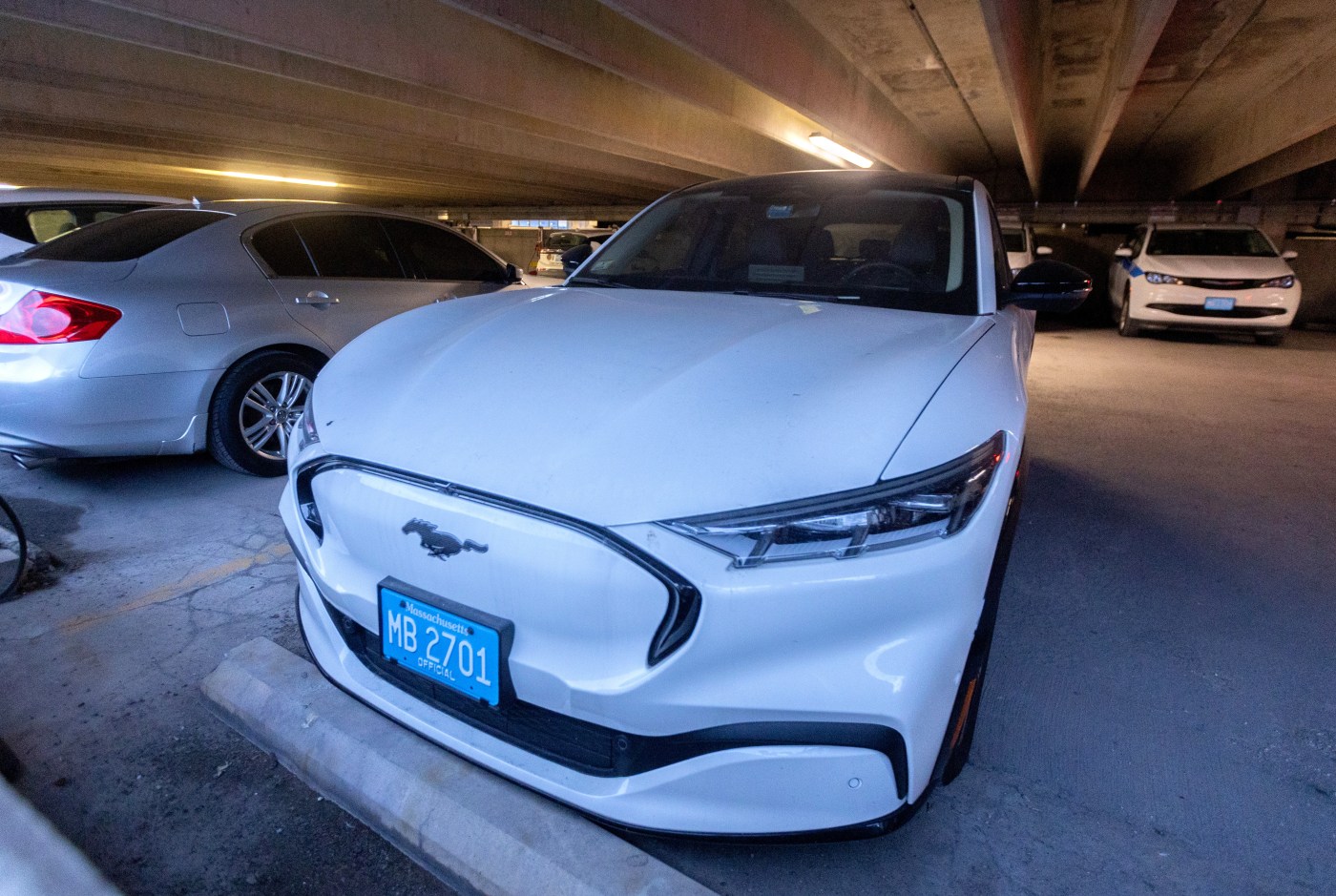
Sticker shock: Boston drops $500K on EV Mustangs for city employees as homeowners face 10.5% tax hike
Boston homeowners bracing for a 10.5% tax increase may be shocked to learn some of their hard-earned tax dollars were spent this year on swanky new Ford Mustang Mach-E’s for city employees — at about $50,000 a pop.
The City of Boston purchased 15 electric vehicles this year, nine of which were Mustang Mach-E’s that command an average price between $50,000 to $55,000 — for nearly $500,000 in total. The other six EVS purchased were from the Chevrolet Equinox line, with an average price tag of $38,000, per data provided by Mayor Michelle Wu’s office.
While the hefty investment cost an eye-popping $678,000 to $723,000 upfront for the 15 fully electric, all-wheel-drive SUV cars in 2024, the mayor’s office insists that the purchases will save the city, and thereby taxpayers, tens of thousands of dollars in the long term — by way of a shift from gas-powered vehicles to climate-friendly EVs.
“The new electric vehicles that have been put into service were swapped out with old vehicles or replaced vehicles that were already turned in,” Wu spokesperson Emma Pettit said in a statement. “The use of EVs will save the City of Boston approximately $10,000 net cost per vehicle due to reduced fueling and maintenance costs, while significantly reducing the carbon footprint from our fleet operations.”
The purchases were made through a city operating budget that grew by 8% this fiscal year, “either directly or using the city’s equipment installment payment financing,” the mayor’s office said. The investment is part of the Wu administration’s goal to shift its aging gas-powered passenger fleet to electric cars.
Wu spent the better part of this year pushing for legislation that would have shifted more of the tax burden from homeowners to businesses, beyond what is allowed by state law, while rejecting calls to cut the city budget as “fiscally irresponsible.”
The bill, which died in the Senate, was aimed at combating falling commercial property values and vacant office space that is eroding the city’s commercial tax base. Given that Boston’s budgetary structure derives more than 70% of revenue from property taxes, city officials say that scenario is pushing more of the tax burden onto homeowners.
“For them to say there’s no place to make cuts, they’re spending money left and right,” Matt Cahill, executive director of the Boston Finance Commission, an independent watchdog agency created to keep an eye on city business, told the Herald Thursday.
Of the new EVS, Cahill said, “I do believe that if they’re moving towards a less polluting car, that’s great, but I think there are decisions to be made amongst which cars are better for the taxpayers to purchase.
“It seems like there should have been some sort of cost analysis done to make sure the cars are cost-effective,” he added.
Such a cost-benefit analysis is done with anyone’s household budget, Cahill said. In this instance, while he pointed out that there’s money built into the city budget for purchasing new vehicles, he said the Wu administration could have considered the cost per mile, repair and replacement costs, including for new batteries.
Wu’s team could have asked whether it was worthwhile to get the pricier Mustangs over the Chevys if its “goal is to reduce the amount of gas-powered vehicles in the city, and that’s a policy that seems to be important to the administration,” he said.
Electric vehicles are generally more expensive than their gas-powered counterparts, Cahill said, and thereby represent a larger investment for the city.
“Then,” he said, “I think it’s important to ask, could we have gotten more electric-powered vehicles if we got the Chevys over the Mustangs, and why are the Mustangs being purchased instead of the Chevys?”
Cahill said it was curious that the city opted against buying the same electric car “across the board,” rather than purchase two types of vehicles for employees.
The mayor’s office said the city’s fleet consists of more than 100 fully electric vehicles, including Chevy Bolts, Ford Focus Electric, Ford E-Transit, and four electric street sweepers.
“The city plans to replace aging passenger vehicles with electric ones where possible, but certain vehicles with special requirements (ex. snowplows) will remain gas-powered,” Pettit said.
That goal aligns with the city’s fleet electrification policy established in 2019, when Marty Walsh was mayor and Wu was a city councilor.
“The city looks to replace vehicles when they are eight years or older, have 100,000 miles or more, maintenance costs that equal or exceed 33% of their original acquisition value, and a depreciated value of 80% or more of the original purchase price,” Pettit said.
Related Articles
Boston Mayor Wu douses city councilor’s call to kill White Stadium plan, defends project amid escalating cost
Indicted Boston City Councilor case evidence includes database of 1M+ files, feds say
After email prompts confusion, Wu administration says Boston City Hall won’t shut down for two weeks over holidays
Boston city councilor calls for Mayor Wu to cancel White Stadium plan after taxpayer tab balloons
Long-time housing, city official announces candidacy for Boston City Council At-Large seat
She also stated that the city’s practice is to choose the cheapest bid that “satisfies the needed vehicle requirements,” when purchasing vehicles through the publicly-advertised supplier portal, which was used for all 15 EVs bought this year.
Pettit emphasized that the “base-model” Mustang Mach-E’s are SUVs, and “not sports cars,” with a price point similar to other comparable vehicles.
A look at the Ford website shows that the 2024 Mustang Mach-E line included four models with prices ranging from those starting at $39,995 to $58,995. The average cost the city provided for the Mustangs seems to indicate a purchase on the higher end of that scale.
Select city employees are driving around swanky new Mustangs at a time when the city’s budgetary crunch has homeowners facing a 10.5% tax increase next year.
“This once again demonstrates how Mayor Wu’s administration prioritizes fiscal responsibility,” Paul Craney, spokesman for the Massachusetts Fiscal Alliance, said in a statement. “More spending, more calls for tax hikes, and more perks for preferred employees.”
Marty Walz, interim president of the Boston Municipal Research Bureau, a watchdog group that keeps an eye on City Hall finances, disagreed, however, saying that she saw the EVs as a “wise investment.”
“Replacing aging combustible engine vehicles with electric vehicles is a wise investment,” Walz said in a statement, “as it will have long-term benefits for the environment and lead to fuel cost savings.”
Hybrid and electric vehicles owned by the cCity of Boston power up yesterday. (Nancy Lane/Boston Herald)
Mayor Michelle Wu and state Rep Rob Consalvo testify last month in the State House on a home-rule petition to tax business owners more. The measure failed. (Matt Stone/Boston Herald)
This electric Mustang went to the Code Enforcement crew. (Matt Stone/Boston Herald)

